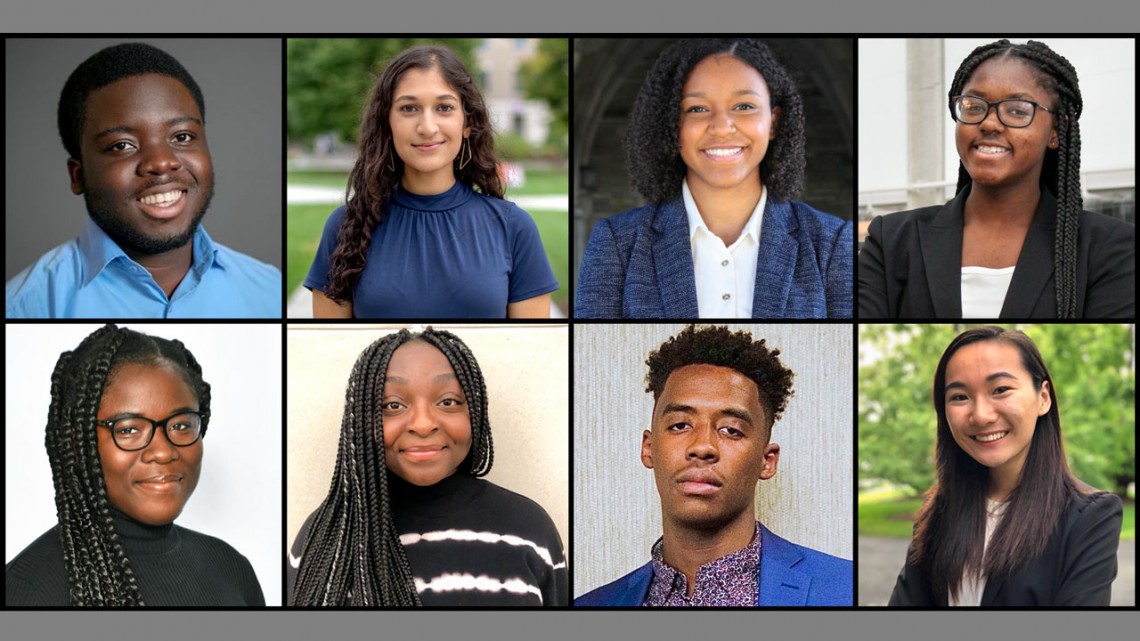
Cornell Students 4 Black Lives e-board members, winner of the 26th annual James A. Perkins Prize for Interracial and Intercultural Peace and Harmony, clockwise from upper left: Glenn Asuo-Asante ’21, Shivali Halabe ’22, Ashley Bishop ’22, Sherell Farmer ’22, Yu An Chen ’22, Avery Williams ’22, Ufuoma Thaddeus ’22 and Basirat Owe ’21.
Cornell Students 4 Black Lives wins annual Perkins Prize
By Amy Gaulke
Cornell Students 4 Black Lives, a student-led organization that last year formed a diverse coalition of more than 290 social, cultural and professional organizations, was awarded the 26th annual James A. Perkins Prize for Interracial and Intercultural Peace and Harmony during a virtual ceremony May 6.
Each year, the Perkins Prize is awarded to a Cornell program, organization or event making the most significant contribution to furthering the ideal of university community while respecting values of diversity.
“Cornell’s commitment to diversity and inclusion goes back to our very beginning, but we must always refresh that commitment, and the ways in which we pursue it must always be evolving,” President Martha E. Pollack said during the event.
Cornell Students 4 Black Lives was established in 2020 with a summer fundraiser that raised $118,000 to support local, state and national nonprofits that demand justice for Black lives. The group educates on Black issues and partners with other Black activist organizations on campus, including the Cornell Abolitionist Revolutionary Society and Black Students United, to push for institutional anti-racist change.
“The Perkins Prize highlights the progress we have made, yet the need [remains] to continue to push forward towards greater equity and inclusion,” said Ryan Lombardi, vice president for student and campus life. “Students, you inspire us, you motivate us. We’re in awe of you and we’re honored to be a part of your educational journey.”
Cornell Trustee Emeritus Thomas W. Jones ’69, MRP ’72, who endowed the Perkins Prize in 1994 in honor of former Cornell President James A. Perkins, delivered opening remarks.
“It has been difficult historical periods like the present when we most need the best and brightest among us to step up and help us find our way,” Jones said. “I hope you will persevere and that your success includes making Cornell University an example of positive and constructive race relations to which all Americans look for guidance and inspiration. You are the people who will write this next chapter of race in America.”
Receiving the Perkins Prize honorable mention was the Building Allyship Series, a program that brings together members of identity groups historically excluded from and underrepresented in the academy, members of the Cornell community identified as strong allies, and others seeking to develop skills for allyship, to collectively learn how to support each other.
This program, conceived and developed by members of the Graduate and Professional Student Diversity Council, with support from the Graduate School Office of Inclusion and Student Engagement, hosts events centered on specific identity groups and themes – such as Dangers of Performative Allyship, Combatting Anti-Blackness, and Coming Out for Allyship with the LGBTQ+ Community – to explore how allyship can mitigate the challenges that members experience in academia.
Two student programs and an alumna received Student and Campus Life (SCL) Diversity and Inclusion Awards, in recognition of advocating for various student populations and engaging with staff, faculty and the local community to promote a more inclusive Cornell:
- The Organization of the Year award was given to Cornell Asian Pacific Student Union (CAPSU) for its ability to adapt to virtual programming requirements brought on by the pandemic. CAPSU hosted events focused on engaging students from diverse backgrounds in frank discussions around the themes of race, class, gender identity and pride in diversity and representation. And in response to recent incidents of Anti-Asian racism and violence, CAPSU has also provided support for students in healing from and processing community trauma.
- The Quiet Influencer Award went to the Translator Interpreter Program (TIP), a student-run program of the Public Service Center. TIP trains multilingual students to serve as volunteer translator-interpreters for community agencies and academic departments in emergency and nonemergency situations. This past year, TIP volunteers served the Cornell and Ithaca community by interpreting for domestic violence and homeless shelters, bridging language barriers between K-12 students, families and teachers, and translating critical information about human trafficking and public-health resources.
- The SCL Diversity and Inclusion Transformational Leadership Award went to Naiara Bezerra-Gastesi ’21, who has worked tirelessly to develop, facilitate and evaluate Queer Sexual Wellness programming on campus while holding leadership roles as co-president of Haven (The LGBTQ+ Student Union), president of Consent Ed and president of the Sexual Violence Prevention Network. In collaboration with professional staff and student staff, Bezerra-Gastesi has helped lead the charge to create the Queer Sexual Wellness and Resiliency Education program, or QSWARE, at the LGBT Resource Center.
“I continue to be energized by the things that happen in this community,” said Marla Love, the Robert W. and Elizabeth C. Staley Interim Dean of Students. “I continue to be excited for where Cornell is headed and the way that our students are deeply involved and committed to our future, and all the ways in which we work together to meet that goal.”
Media Contact
Get Cornell news delivered right to your inbox.
Subscribe
